Episodes
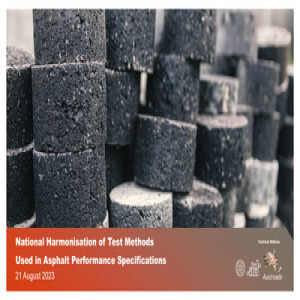
Monday Aug 21, 2023
Monday Aug 21, 2023
The asphalt industry is rapidly evolving, and it is widely accepted that prescriptive specifications are not necessarily well suited to take full advantage of the benefits that new and innovative technologies can provide. There is therefore a desire to develop a national performance-based asphalt specification that would allow asset owners and asphalt suppliers to take full advantage of the enhanced performance characteristics of current and emerging asphalt technologies.
This webinar, presented by Joe Grobler, provides an overview of a recently completed Austroads project undertaken to harmonise test methods used in asphalt performance specifications. The project developed three new Austroads asphalt test methods and updated several existing methods for use in future performance-based specifications.
The project also collated available flexural modulus, fatigue resistance and permanent deformation resistance test data of locally manufactured asphalt mixes to inform the future development of these performance limits.
The presenter talks about the background to the new test methods and the indicative performance limits established for modulus, fatigue and permanent deformation resistance.
This work builds on the results of the previous Austroads project that developed a national performance-based asphalt specification framework.
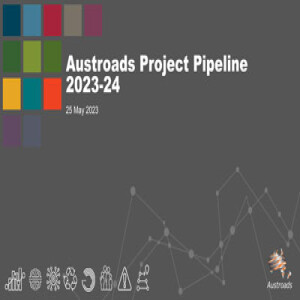
Thursday May 25, 2023
Austroads Project Pipeline 2023-24
Thursday May 25, 2023
Thursday May 25, 2023
This webinar is beneficial to consultants who may be interested in tendering for Austroads projects. The session covers new Austroads projects lined up for the 2023-24 financial year, Austroads process around research data collection and what is required to become a successful tenderer.
To find information about Austroads' current tenders, visit the tenders webpage. On that page, you can also subscribe to our Tenders newsletter to receive alerts when a new project is advertised.

Wednesday Mar 22, 2023
Asphalt Laboratory Fatigue Relationships
Wednesday Mar 22, 2023
Wednesday Mar 22, 2023
The Austroads mechanistic-empirical design system documented in Part 2 of the Guide to Pavement Technology uses a laboratory fatigue relationship previously developed by Shell to predict the fatigue life of asphalt layers. The Shell fatigue relationship was developed over 40 years ago based on testing a selection of asphalt mixes from Europe and the USA. The mixes used to develop the original relationship are therefore unlikely to represent the modulus and fatigue behaviour of modern mixes (including mixes incorporating recycled materials) currently being used in Australia and New Zealand.
Austroads project Asphalt Laboratory Fatigue Relationship – Stage 1 Utilisation of Existing Data benchmarked available fatigue laboratory test results of locally manufactured asphalt mixes against the fatigue performance predicted by the generic Austroads fatigue relationship. The project also reviewed some important modulus and fatigue testing parameters that may affect the design of asphalt layers, including different sample preparation methods and the minimum number of test specimens required to develop a laboratory fatigue relationship.
This webinar with Joe Grobler, Dr Negin Zhalehjoo and Peter Bryant, presents the findings of the project, including the preliminary fatigue relationships developed for locally manufactured asphalt mixes with conventional (unmodified) bitumen.
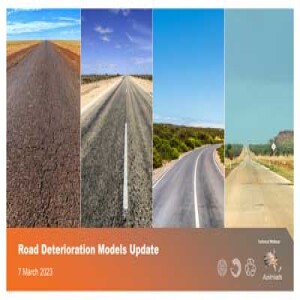
Tuesday Mar 07, 2023
Road Deterioration Model Update
Tuesday Mar 07, 2023
Tuesday Mar 07, 2023
Road deterioration (RD) models help in predicting future road condition and assessing maintenance needs. Austroads’ recent project updated the current Austroads RD models using the additional long-term pavement performance (LTPP) and long-term pavement performance maintenance (LTPPM) data as well as other available data, such as the traffic speed deflectometer (TSD) datasets, to improve these models’ explanatory power to support wider loading and the climate conditions observed in Australia. The updated and improved RD models can predict the impact of the wider loading and climate conditions observed in Australia.
The project produced four Austroads publications covering the updated RD models for cracking, strength (deflection), rutting and roughness. The project was managed in conjunction with the technical support of a Project Working Group sourced from industry and the road agencies. In addition, expert advice was sought from acknowledged experts in industry and academia.
Each of the reports documented a literature review of the state-of-the-art in deterioration modelling, a review of the available datasets for each of the RD models, the approach used to update each of the RD models and the validation of the rutting and roughness RD models.
This webinar with Dr Tim Martin, Ranita Sen and Tyrone Toole presents an overview of the methodology used to achieve the above objectives and the outcomes of the project.
The session covers:
- the basis for using the LTPP and LTPPM datasets for updating the RD models, including use of the TSD automatic crack detection (ACD) device data specifically for the update of the RD model for cracking
- the methodology adopted for updating the RD models
- validation of the rutting and roughness RD models.
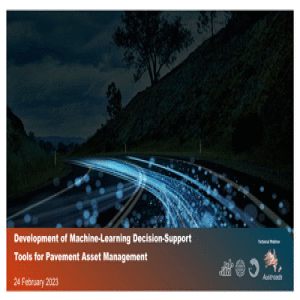
Friday Feb 24, 2023
Friday Feb 24, 2023
This is the second webinar in a two-webinar series. The session describes two case studies in the use of machine learning (ML) and artificial intelligence (AI) to create decision-support tools for pavement asset management.
In the first study, we explore whether ML can learn to reproduce expert treatment decisions and automatically identify candidate projects, using historic condition, treatment and inventory data.
In the second study, we explore extensions to conventional Pavement Management System (PMS) optimisation tools which provide insight into the network-wide implications of various multi-criteria funding allocation scenarios, and the levels of service that can potentially be realised.
The webinar is presented by Tim Cross and David Rawlinson.
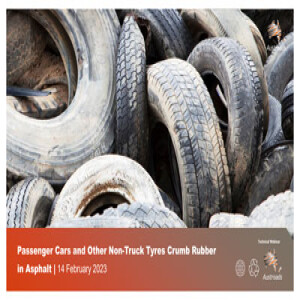
Tuesday Feb 14, 2023
Passenger Cars and other Non-Truck Tyres Crumb Rubber in Asphalt
Tuesday Feb 14, 2023
Tuesday Feb 14, 2023
This webinar focuses on the Austroads report Passenger Cars and other Non-truck Tyres Crumb Rubber in Asphalt: National Market Analysis, Review of Industry Practices and Technology Transfer.
The report provides a comprehensive overview of the fate and availability of end-of-life tyres from other-than-truck sources, such as passenger car tyres and mining and agricultural tyres, for road paving operations.
The webinar, presented by Anna D'Angelo from the Australian Flexible Pavement Association and Associate Professor Filippo Giustozzi from RMIT, discusses the market-readiness of Australia and New Zealand to use recycled crumb rubber in asphalt from a variety of end-of-life tyres rather than a single source (i.e. truck tyres).
The session provides information on the current tyre recycling industry across Australia and New Zealand and the evaluation of potential technological opportunities to produce crumb rubber in both countries.
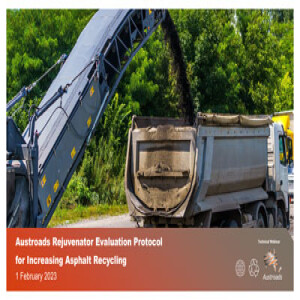
Wednesday Feb 01, 2023
Austroads Rejuvenator Evaluation Protocol for Increasing Asphalt Recycling
Wednesday Feb 01, 2023
Wednesday Feb 01, 2023
The use of reclaimed asphalt pavement (RAP) in new asphalt mixes is a common practice in Australia and New Zealand due to its many benefits. RAP contents are typically about 10–20% but higher contents can be used, if the effect of the aged binders present in RAP is accounted for. Rejuvenators can be used to soften the hardened binders which are present in RAP, and are therefore considered an essential component for producing high-content RAP mixes.
Although Australian and New Zealand asphalt producers acknowledge the importance of rejuvenators (in particular when producing high RAP mixes), rejuvenators are not commonly used due to the lack of specifications/guidelines that can evaluate the potential performance of rejuvenators when used in RAP mixes. To address this issue, Austroads has developed a rejuvenator evaluation protocol. In this protocol, rejuvenators are evaluated as part of binder blends, and their short/long-term ageing resistance is assessed to ensure their performance at the production stage as well as during service in the long term.
This webinar with Young Choi, Robert Busuttil and Robert Urquhart presents the proposed protocol and its development work. The development work involved a literature review into international rejuvenator specifications and research studies, in particular those which investigated the effect of rejuvenator properties on the properties/ performance of asphalt binders and mixes.
The development work involved obtaining feedback from Austroads technical group members and international experts. These studies were conducted to ensure that the evaluation protocol is robust and practical.
The webinar also covers a plan for future validation studies which will ensure that the protocol is suitable for use in Australia and New Zealand.
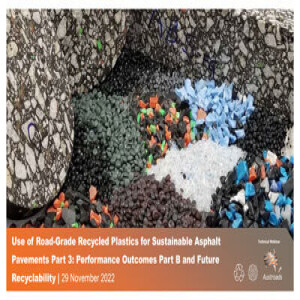
Tuesday Nov 29, 2022
Tuesday Nov 29, 2022
Austroads has completed its project APT6305 Use of Road-grade Recycled Plastics for Sustainable Asphalt Pavements which was investigating road-grade recycled plastics that can be used to construct and maintain asphalt roads.
The project results are provided in four reports:
The first report examined the use of road-grade recycled plastics in asphalt pavements and investigated the most suitable types of recycled plastics for incorporation into asphalt.
The second report provided a comprehensive overview of the development of various testing frameworks for the characterisation of road-grade recycled plastic, the incorporation of recycled plastics in bitumen and asphalt and the study of possible emissions and microplastics release.
Report 3 Part A presented the results of the experimental investigation on recycled plastics in asphalt and bitumen by focusing on the asphalt and bitumen properties, microplastics and emissions. The report focused on the wet and dry method of incorporation of plastics into asphalt.
This 75-minute webinar focuses on Part B of the third report outlining the mixed methods (i.e., low melting point plastics as additive to modify asphalt) performance and environmental assessment and expanding on the recyclability of reclaimed plastic-modified asphalt.
The webinar was presented by Andrew Papacostas from Department of Transport Victoria, Associate Professor Filippo Giustozzi from RMIT University and his team, including Dr Marie Enfrin, Yeong Jia Boom, and Dr Dai Lu Xuan.
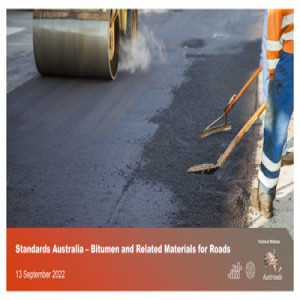
Tuesday Sep 13, 2022
Standards Australia – Bitumen and Related Materials for Roads
Tuesday Sep 13, 2022
Tuesday Sep 13, 2022
In Australia and New Zealand, bituminous binders used in road construction are tested prior to use to ensure they will perform satisfactorily during road construction/maintenance. Some of the Australian Standards that are used for these tests have not been updated for 25 years which can make it difficult for testing laboratories to adhere to them.
In this webinar Dr Robert Urquhart presents an overview of an Austroads project which provided expert technical input into the revision of seven Australian Standards – four bituminous emulsion, one polymer modified binder and two cutback bitumen related Australian Standard test methods. They were revised by the Australian Standards Committee CH-025 ‘Bitumen and related products for roadmaking’ between August 2020 and September 2022.
Following topics are covered in the session:
- the process used to update an Australian Standard
- the main changes to each of the seven Standards
- the status of revision of each Standard
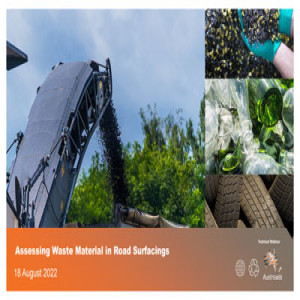
Thursday Aug 18, 2022
Assessing Waste Material in Road Surfacings
Thursday Aug 18, 2022
Thursday Aug 18, 2022
Governments, transport agencies, and industry have identified the need to reduce waste going to landfill and increase the use of recycled materials to achieve more sustainable development and improve outcomes for communities. The latest update to the Guide to Pavement Technology Part 4E: Recycled Materials covers the advancement in material re-use that has occurred in the 13 years since the 2009 version of the guide was published.
There is wide concern around the misuse of recycled materials in road construction, and it is generally agreed that roads should not be viewed as alternative avenues for waste disposal. A protocol has been established that follows a step-by-step process for quantifying the effect of using novel, post-consumer and industrial wastes or recycled materials in asphalt pavements and sprayed seal surfacings.
This webinar covers the following key updates made to the Austroads Guide to Pavement Technology Part 4E: Recycled Materials:
- Latest and emerging recycled materials utilised within pavements and information on their use in specific applications as well as associated issues, risks, and considerations.
- The developed holistic assessment framework for the use of recycled materials in road pavements.
- The developed protocol for asphalt and sprayed seals that establishes a step-by-step process for quantifying the effect of using novel, post-consumer and industrial wastes or recycled materials.
The webinar is presented by Phil Herrington from WSP New Zealand, Brody Clark from WSP Australia with participation of Grant Bosma from Waka Kotahi NZ Transport Agency and Mike Pickering from the Queensland Department of Transport and Main Roads.

